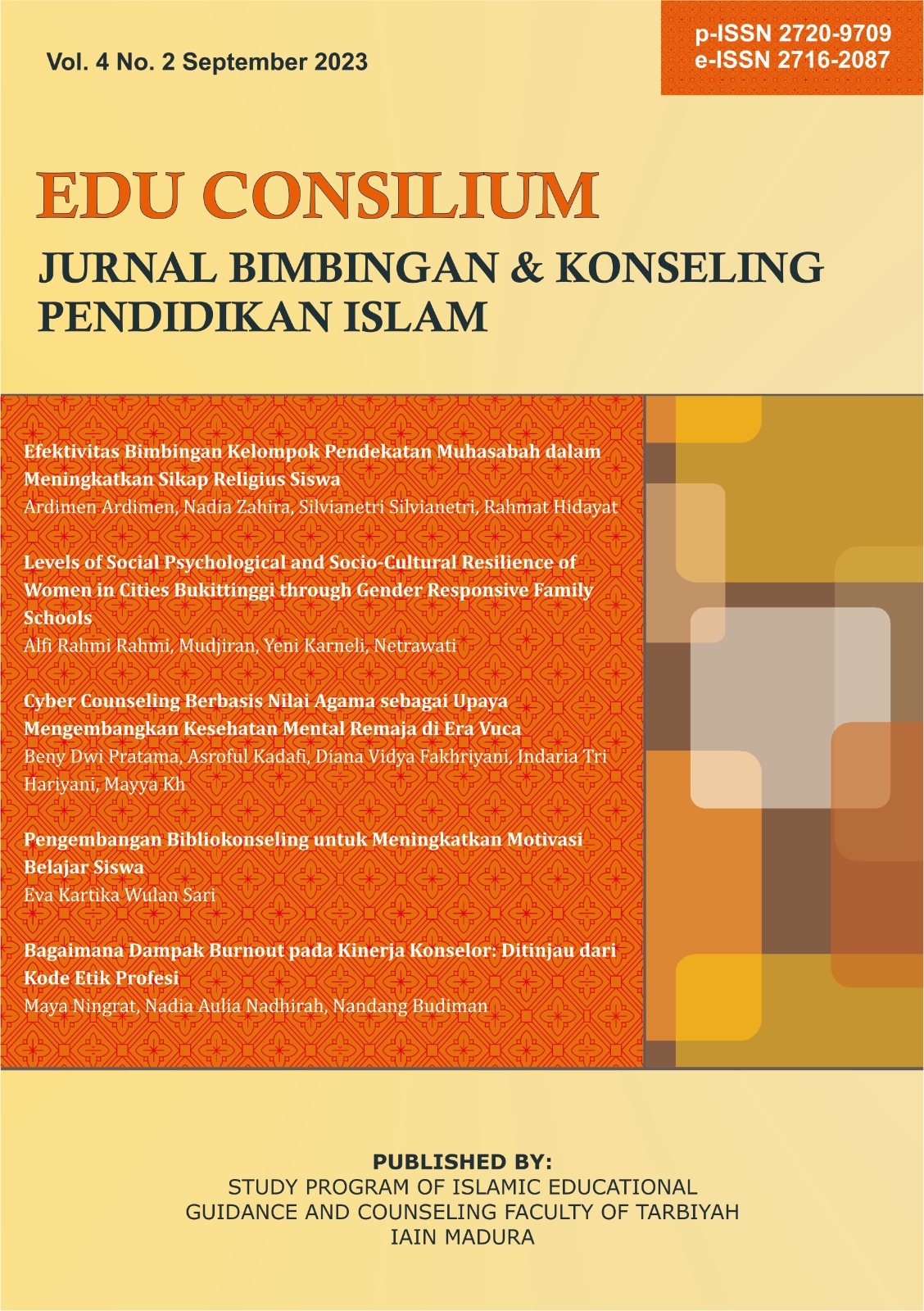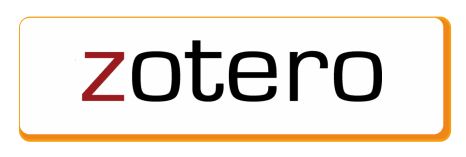Analisis Minat Karier Berdasarkan Teori Karier Holland Siswa Sekolah Menengah Pertama di Kabupaten Gresik
 Abstract views: 1623
,
Abstract views: 1623
,
 PDF downloads: 3673
PDF downloads: 3673
Abstract
This study aims to analyze the career interests of junior high school students in the city of Gresik. Data collection used career interest instruments based on Holland's career theory (RIASEC) which was then developed by researchers. This research uses descriptive quantitative research. Sampling used random sampling of 476 students in SMPN Gresik city area (Sunan Giri Gresik Middle School with 88 students, Gresik 2nd Middle School with 298 students, and Gresik 15th Middle School with 90 students). The research instrument was tested for the validation and reliability of Cronbach's alpha. The results showed that the career personality type of junior high school students in Gresik district was the highest, namely the social career personality type, which was 32.8%. Next, namely the career personality type towards the conventional type as much as 18.7%. As many as 14.9% of junior high school students in Gresik district have a realistic career personality type. As many as 11.1% of junior high school students in Gresik district have the investigative career personality type. 12% of junior high school students in Gresik Regency and 10.5% of students have artistic career personality types.
Downloads
References
Amalianita, B., & Putri, Y. E. (2019a). Perspektif Holland Theory serta Aplikasinya dalam Bimbingan dan Konseling Karier. JRTI (Jurnal Riset Tindakan Indonesia), 4(2), 63–70. http://jurnal.iicet.org/index.php/jrti
Amalianita, B., & Putri, Y. E. (2019b). Perspektif Holland Theory serta Aplikasinya dalam Bimbingan dan Konseling Karir. JRTI (Jurnal Riset Tindakan Indonesia), 4(2), 63–70. https://doi.org/10.29210/3003490000
Armstrong, P. I., & Vogel, D. L. (2010). “Interpreting the interest-efficacy association from a RIASEC perspective”: Correction. Journal of Counseling Psychology, 57(1), 127–127. https://doi.org/10.1037/a0017878
Arokianathan, N. A., Zainudin, Z. N., & Yusop, Y. M. (2019). HOLLAND’S THEORY IN CAREER COUNSELLING: A SYSTEMATIC REVIEW. Conference: KONVENSYEN KAUNSELING KEBANGSAAN KALI KE 21At: UPM.
Basri, H., Afdal, A., & Yusuf, A. M. (2021). Kesesuaian Antara Bakat dan Minat dalam Menentukan Jurusan Pendidikan Tinggi Melalui Bimbingan Karir di Sekolah Menengah Atas. SCHOULID: Indonesian Journal of School Counseling, 6(2), 157–163. https://jurnal.iicet.org/index.php/schoulid/article/view/885
Baumeister, R. F. (1993). Conceptions of Self and Identity. In Fifty Years of Personality Psychology (pp. 177–186). Springer US. https://doi.org/10.1007/978-1-4899-2311-0_12
Creswell, J. W. (2014). Research Design: Qualitative, Quantitative and Mixed Methods Approaches, 4 Edition. Sage.
Fakhriyani, D. V., & Sa’idah, I. (2023). Efektifitas Layanan Bimbingan Karier Terhadap Perencanaan Karier Pada Santri Tingkat Akhir. Consilium: Berkala Kajian Konseling dan Ilmu Keagamaan, 9(2), 107-115. http://dx.doi.org/10.37064/consilium.v9i2.12345
Fauziah, F. (2021). Hubungan Sikap Orang Tua dengan Perkembangan Sosial Emosional Remaja di SMPN 6 Bukittingi. Universitas Negeri Padang.
Fitria, L., Iswari, M., & Afdal. (2020). Pentingnya bimbingan karir pada kegiatan PKK. Jurnal Bimbingan Dan Konseling, 5(2), 141–145.
Hanafi, I., Sa’idah, I., & Fakhriyani, D. V. (2021). Pengembangan Karier Berdasarkan Identitas Dan Aspirasi Karier Santri (Pendampingan Bimbingan Karier di Pondok Pesantren Al-Kautsar Pamekasan). PERDIKAN (Journal of Community Engagement), 3(1), 20-26. https://doi.org/10.19105/pjce.v3i1.4341
Hartmann, F., Heine, J.-H., & Ertl, B. (2021). Concepts and Coefficients Based on John L. Holland’s Theory of Vocational Choice—Examining the R Package holland. Psych, 3(4), 728–750. https://doi.org/10.3390/psych3040047
Klover, D. M. (1938). The career decision. Dissertationsand Theses. Portland State University.
Kumari, A., Sharmila, K., & Agrawal, S. (2022). Aspect of Identity Crisis Faced by Adolescents: A Comparative Study of Rudrapur and Lucknow. Asian Pacific Journal of Health Sciences, 9(2), 165–168. https://doi.org/10.21276/apjhs.2022.9.2.33
Mudhar, Murwani, F. D., Hitipeuw, I., & Rahmawati, H. (2020). Career interest data trends in era information technology of high school students at Surabaya, Indonesia. Data in Brief, 30, 105480. https://doi.org/10.1016/j.dib.2020.105480
Mufidah, E. F., Ardika, D., & Farid, M. (2022). PEMBERIAN LAYANAN TES BAKAT MINAT KARIER UNTUK SISWA SMK. BUGUH: JURNAL PENGABDIAN KEPADA MASYARAKAT, 2(1), 61–66.
Muwakhidah, Elia Firda, M., Mudhar, & Moesarofah. (2022). PEMBERIAN LAYANAN BIMBINGAN KARIER DI SMK SUNAN AMPEL MENGANTI GRESIK. Kanigara: Jurnal Pengabdian Kepada Masyarakat, II(2), 295–300.
Nyamwange, J. (2016). Influence of Student’s Interest on Career Choice among First Year University Students in Public and Private Universities in Kisii County , Kenya. Journal of Education and Practice, 7(4), 96–102. www.iiste.org
Patton, W., & Mary, M. (2014). Career Development and Systems Theory Connecting Theory and Practice. Sense Publisher.
Poerwati, T., & Endarwati, M. C. (2017). Bentuk Kegiatan Masyarakat Pada Kawasan Industri Berdasarkan Perilaku Masyarakat Di Kota Gresik. PAWON: Jurnal Arsitektur, 1(2).
Putri, R. D., & Purnamasari, S. (2018). Penggunaan Materi Teori Karier John Holland Terhadap Peningkatan Perencanaan Karier Siswa Melalui Layanan Informasi Bermuatan Pembelajaran Kontekstual. Wahana Didaktika : Jurnal Ilmu Kependidikan, 16(2), 243. https://doi.org/10.31851/wahanadidaktika.v16i2.2053
Putri, R. D., & Sari, S. P. (2018). IMPLEMENTATION OF JOHN HOLLAND’S CAREER THEORY IN GUIDANCE AND COUNSELING. ENLIGHTEN (Jurnal Bimbingan Dan Konseling Islam), 1(2), 126–132. https://doi.org/10.32505/enlighten.v1i2.768
Ramadhani, E., & Jannah, A. T. (2020). ANALISIS BIMBINGAN KARIR TEORI HOLLAND DALAM PERENCANAAN KARIR SISWA. Jurnal Konseling Komprehensif: Kajian Teori Dan Praktik Bimbingan Dan Konseling, 7(2), 16–22.
Rasheed, S., Al-Barhamtoshy, H. M., Saifaddin, H. B., & Shalash, W. (2019). Assessment of Vocational Types and EEG Analysis Using Holland Test Questionnaire. Proceedings of the 2019 International Conference on Artificial Intelligence, Robotics and Control, 53–60. https://doi.org/10.1145/3388218.3388230
Sa’idah, I. (2018). Memprediksi Minat Karier dan Pilihan Aspirasi Terhadap Pertimbangan Pilihan Karier Berdasarkan Social Cognitive Career Theory (SCCT). JKI (Jurnal Konseling Indonesia), 3(2), 48-56.
Sa'idah, I., Atmoko, A., & Muslihati, M. (2021). Aspirasi Karier Generasi Milenial. Edu Consilium: Jurnal Bimbingan dan Konseling Pendidikan Islam, 2(1), 62-89. https://doi.org/10.19105/ec.v2i1.4429
Sheldon, K. M., Holliday, G., Titova, L., & Benson, C. (2020). Comparing Holland and Self-Determination Theory Measures of Career Preference as Predictors of Career Choice. Journal of Career Assessment, 28(1), 28–42. https://doi.org/10.1177/1069072718823003
Sugiyono. (2016). Metode Penelitian Kuantitatif, Kualitatif dan R&D. PT Alfabet.
Suryani, A. I. (2020). Peran Guru Bimbingan Konseling Dalam Pemilihan Jurusan Di Sekolah Menengah Atas Negeri 2 Siak Hulu Kecamatan Siak Hulu Kabupaten Kampar Provinsi Riau. Universitas Islam Negeri Sultan Syarif Kasim Riau.
Wahyudi, I., Yusuf, A. M., & Afdal, A. (2021). Analisis Terhadap Holland Theory Dan Implikasinya Dalam Bimbingan Karir Pada Siswa. EDUKATIF : JURNAL ILMU PENDIDIKAN, 3(5), 1880–1890. https://doi.org/10.31004/edukatif.v3i5.668
Winkel, W., & Hastuti, S. (2005). Bimbingan dan Konseling di Institusi Pendidikan. Media Abadi.
Zainudin, Z. N., Lee, W. R., Rong, Othman, W. N. W., Nor, A. M., & Yusop, Y. M. (2020). THE RELATIONSHIP OF HOLLAND THEORY IN CAREER DECISION MAKING: A SYSTEMATIC REVIEW OF LITERATURE. Journal of Critical Reviews, 7(09). https://doi.org/10.31838/jcr.07.09.165
The journal operates an Open Access policy under a Creative Commons Non-Commercial 4.0 International license. Authors who publish with this journal agree to the following terms:
- Authors retain copyright and grant the journal right of first publication with the work simultaneously licensed under a
 Commons Attribution-NonCommercial 4.0 International License
Commons Attribution-NonCommercial 4.0 International Licensethat allows others to share — copy and redistribute the material in any medium or format, and adapt — remix, transform, and build upon the material.
- Authors are able to enter into separate, additional contractual arrangements for the non-exclusive distribution of the journal's published version of the work (e.g., post it to an institutional repository or publish it in a book), with an acknowledgement of its initial publication in this journal.
- Authors are permitted and encouraged to post their work online (e.g., in institutional repositories or on their website) prior to and during the submission process, as it can lead to productive exchanges, as well as earlier and greater citation of published work (see The Effect of Open Access).




















